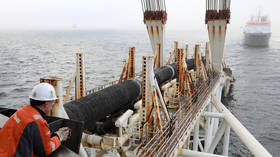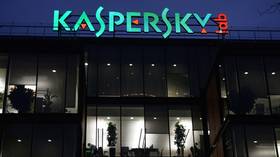‘Bees returned to honey’: Sanctions failed to stop Germany’s record investment in Russia

The fact that German investments in Russia hit a ten-year record high in 2018 shows that the pressure Washington has exerted on Europe failed to discourage German businesses from returning to the Russian market, analysts believe.
Some four years after the first sanctions against Moscow were imposed by Washington and its allies, German investments in the Russian economy reached €3.2 billion, the highest level in a decade, and exceeded the level reached back in 2008 – the year when Russia enjoyed the benefits of high oil prices.
German investments in Russia highest in decade despite Western sanctionshttps://t.co/mgwJfrXwOEpic.twitter.com/capO95ZdEk
— RT (@RT_com) 16 апреля 2019 г.
This shows that German companies have overcome the shock caused by the initial imposition of anti-Russian sanctions and are now rushing to make up for losses they suffered, as they apparently believe that the benefits of Germany’s “natural” partnership with Russia outweigh the risk of angering Washington, analysts told RT.

Although initially “it was incredibly difficult to find international partners willing to do any business with any even non-blacklisted Russian interests whatsoever, due to fear of US retribution,” over the years German companies came to an understanding that the losses suffered due to their reluctance to deal with Russian partners could be even higher than the risks of non-compliance with the US demands, Jack Worthington, a managing partner at the New York-based Arundel & Co trading and consulting company, told RT.
Also on rt.com Anti-Russian sanctions benefit only US firms at Europe’s expense, says German politician“Germans felt more free to trade with Russia in their own self-interests despite” the US pressure, he said. The fear of potential fallout eventually gave way to the anticipation of mutually beneficial economic opportunities at an “easily accessible high growth potential emerging market on Germany’s doorstep.”
“2018 represents pent-up, suppressed demand being released,” Worthington explained, adding that such developments were apparently “inevitable” as the US allies in Berlin gradually grew tired of Washington’s nagging.
#Turkey embraces #Russia’s national payment system credit card #Mirhttps://t.co/dYurM1XKVDpic.twitter.com/hfexqtL9eG
— RT (@RT_com) 20 апреля 2019 г.
German economist Max Otte believes that Germany and Russia have developed such a strong economic bond over the decades of cooperation that it is unlikely to be disrupted by any artificial restrictions imposed by third parties.
“Apparently, the mutual synergies and the natural partnership between both countries is so robust that even economic sanctions and economic warfare cannot destroy it,” said Otte, a professor at the University of Applied Sciences in Worms as well as the head of the Cologne-based IFVE institute for asset management.
The recent spike in German investments in Russia came as part of Berlin's broader foreign investment drive, Otte explained.
Due to its geographic proximity, sizeable market, and a traditionally high demand for high-quality German goods, Russia has always been an attractive target for German investments, said Juergen Koenig, general director of the Russian branch office of Merck, the German multinational pharmaceutical, chemical and life sciences company.
Also on rt.com France’s Total to invest in Russian LNG terminals in Arctic & Far EastAs they gradually adapted to a new environment of US and EU sanctions imposed against Russia, German enterprises thought it was the right time to make up for their losses on the Russian market, Koenig believes.
“Most probably, now is the Russian time,” he said.
US attempts to get in the way of natural economic development in relations between Russia and Europe, and Germany in particular, were doomed to fail from the very beginning, analysts believe, warning that they could have a “boomerang effect” that would ultimately hurt Americans.
“You can’t keep bees from honey,” Worthington said. “Trying to prevent entrepreneurial German and Russian business people from interacting for mutual benefit without US approval is the height of arrogance and stupidity destined to fail.”
“As the daily [US] propaganda rhetoric grew increasingly ridiculous and dull… the bees returned to the honey,” the analyst added.
Think your friends would be interested? Share this story!













